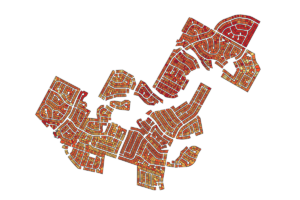Julie Schell, assistant vice provost and director of the Office of Academic Technology, joined President Jay Hartzell at the Longhorn Family Partners Spring Meeting to discuss how artificial intelligence in the classroom relates to UT’s new honor code and student careers.
Longhorn Family Partners are some of The University of Texas at Austin’s most generous parent and family supporters. All attendees have current or incoming Longhorn students and attend two events a year with President Hartzell, where they learn about important initiatives on campus.
The discussion started with Schell explaining that there is a lot of ambiguity when it comes to using AI in teaching and learning. “AI is full of paradoxes,” she said. “For example, AI offers unprecedented opportunities for learning, and it can also teach you bad information.”
Schell, who also teaches in the Department of Design at UT Austin, noticed that students had a deep-seated uncertainty about how to use AI in ways that are ethical and responsible for classroom settings. This theme can be seen across national findings among college students who expect institutions to help them engage with AI in an ethical manner. Ultimately, those findings and students’ need for guidance led Schell to think about how to help all students engage in both AI-forward and AI-responsible ways — honing their ethical and intellectual compasses as they explore AI in their education and careers.
“I think AI is offering jobs to UT students, rather than taking them away,” said Schell when asked about the influence of AI on careers. She continued, saying that AI is providing students with opportunities to practice critical and analytical thinking, problem-solving and creativity. Such durable skills are necessary for the workforce.
“Future success,” she said, “particularly for knowledge workers, will not be driven by AI but by people who have mastered how to learn, adopt and adapt to the ambiguity that comes along with technological advancements like the kind we are seeing with AI right now.”
Schell said UT Austin is blending emerging technology with education to engage students in serving as the architects of their own ethical frameworks when it comes to generative AI.
“There is a lot of concern, nationwide, around cheating with AI,” she said. “The truth is that given that rapid developments and disruptions technology brings, our academic integrity approaches in higher education need to be tech-agnostic.”
Last fall, the University introduced a new honor code to students, staff and faculty. This revamped code encourages students to pledge do their work honestly, respectfully and through the intentional pursuit of learning and scholarship.
“What I love about the new honor code is that it moved away from having students say what they would not do, to more affirmative statements.,” Schell said. “The new honor code also includes a promise to celebrate the learning process and any mistakes made along the way.”
Academic integrity is a process, and at UT Austin, it involves helping students approach their learning in ways that uphold UT values and standards. “We aim to create a campus culture where academic integrity flourishes, not from the fear of being caught but from the understanding that learning is the reward for an honest pursuit of knowledge,” Schell said.



